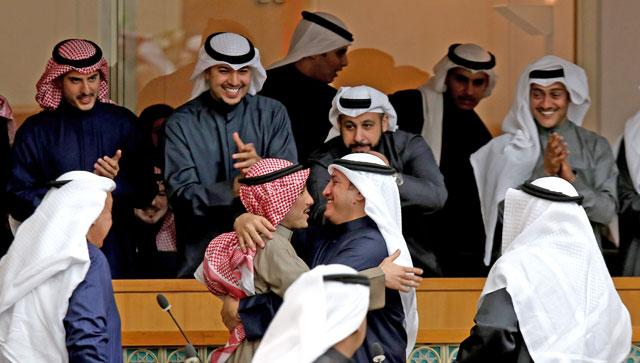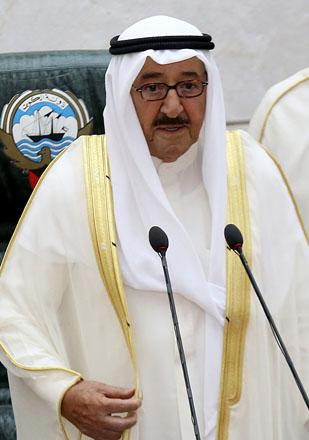You are here
Kuwait emir tells MPs spending cuts 'inevitable'
By AFP - Dec 11,2016 - Last updated at Dec 11,2016

MPs congratulate Kuwaiti parliament speaker Marzouk Al Ghanem (centre) after his election during the opening session of the new parliament in Kuwait City on Sunday (AFP photo)
KUWAIT CITY — Kuwait's Emir Sheikh Sabah Al Ahmad Al Sabah opened the new parliament on Sunday by declaring that a reduction in public spending is "inevitable" in the face of weak oil prices.
The emir said the sharp drop in oil revenues has resulted in a huge budget deficit and "there is no other option but to take effective measures to deal with it".
"I am confident that parliament and my brother citizens are all aware that reducing public expenditure is inevitable through well-studied measures," he said.
He, however, said that those measures should spare low income people and take into consideration social justice.
OPEC member Kuwait, which sits on around 7 per cent of the world's proven crude reserves, has sought to cut spending and boost non-oil revenues in a bid to diversify its economy.
But the measures, which included raising electricity and fuel prices, triggered a political crisis that led the ruler to dissolve the previous parliament in October and call for snap polls.
In the November 26 polls, the opposition which vowed to reject austerity measures won nearly half of the 50 seats.
Most of the other candidates also opposed the measures.
Before crude prices began to slide in mid-2014, Kuwait generated about 95 per cent of its income from oil.
But the country's oil revenues dropped from a massive $97 billion in the 2013-2014 fiscal year to just $40 billion in the last financial year, which ended on March 31, according to finance ministry figures.
And oil income is projected to slide further to around $35 billion this fiscal year.
In 2015-2016, the OPEC state posted its first budget deficit, of $15 billion, in 16 years. It is projecting a shortfall of $29 billion this year.
During its run of surpluses, Kuwait amassed reserves worth $600 billion invested mostly abroad.
Kuwait has been providing a generous cradle-to-grave welfare system to its nationals, who make up 30 per cent of its population of 4.4 million.
"I would not have liked to ask you any day to drop anything of the welfare [you have been getting]," the emir said in his speech.
To plug a growing budget shortfall, the Gulf state has started borrowing for the first time in two decades.
Parliament on Sunday reelected pro-government Marzouk Al-Ghanem as its speaker for a new four-year term and pro-government MP Issa Al Kundari as his deputy, in a blow to opposition candidates.
The Islamist-led opposition controls nearly half of the 50-member parliament while 15 unelected Cabinet ministers out of a 16-strong lineup become members of the national assembly and can vote.
Related Articles
Government revenues in Kuwait dropped 4.4 per cent in the first half of the fiscal year due to sliding oil prices, but the energy-rich emirate still reported a healthy provisional surplus.
KUWAIT CITY — Kuwait's ruler called Tuesday on officials in the oil-rich state to seek alternative revenue sources and reduce public expendi
KUWAIT CITY — Kuwait must enact further subsidy reforms to trim its budget deficit resulting from low oil prices despite political sensitivi












